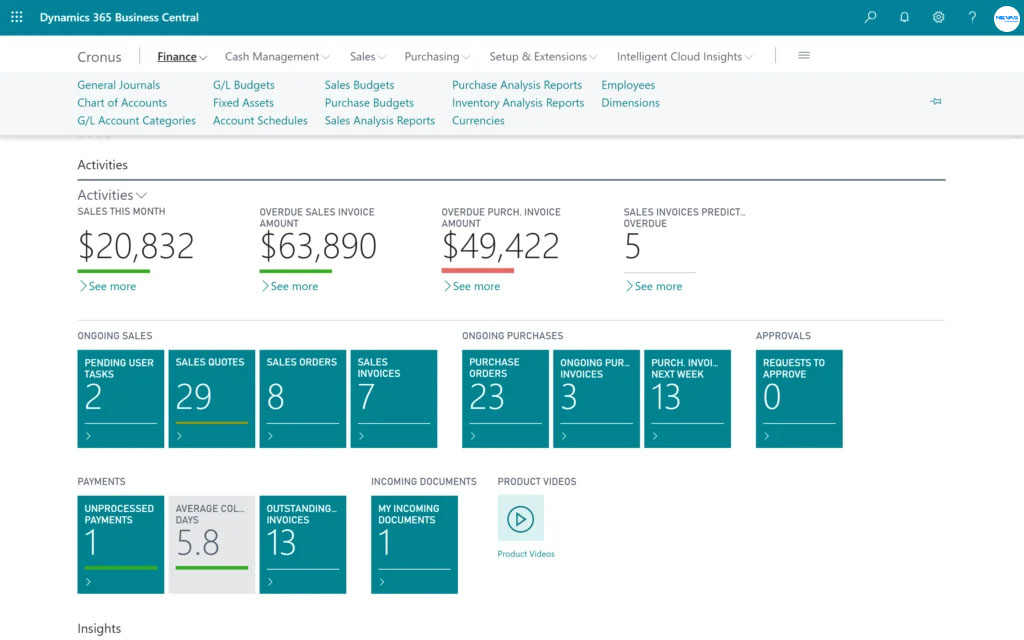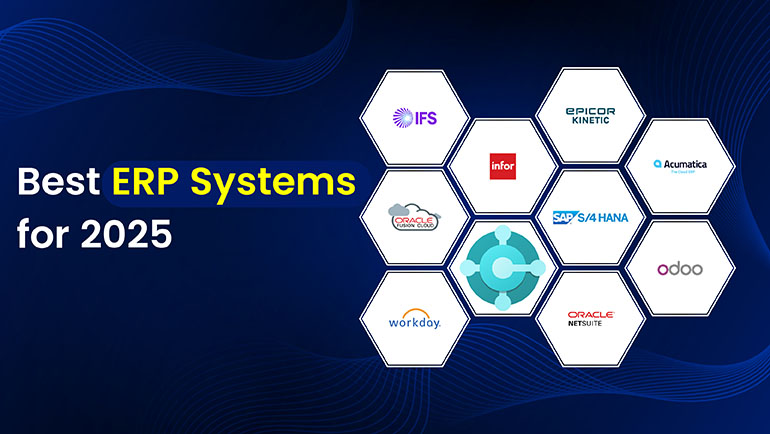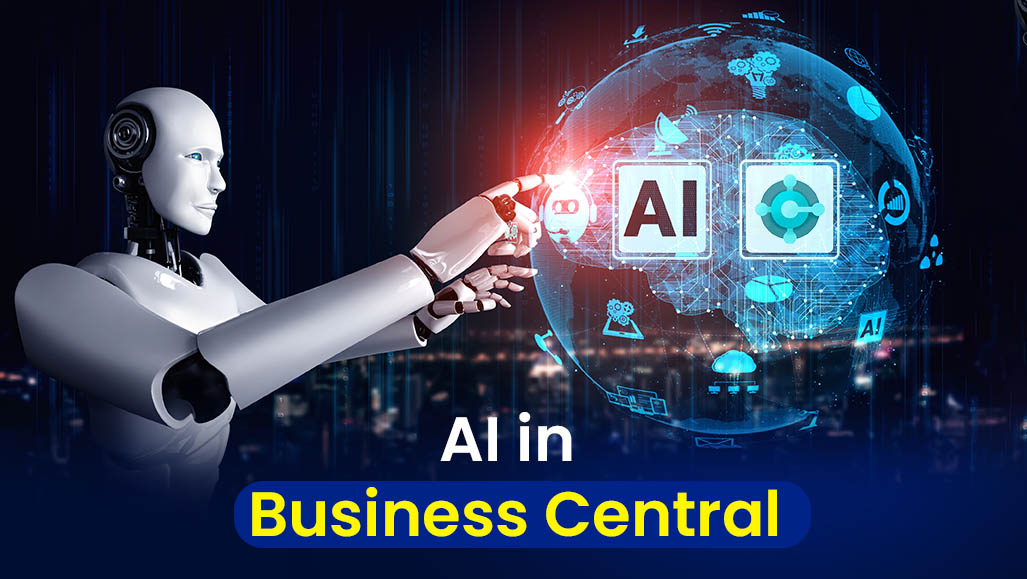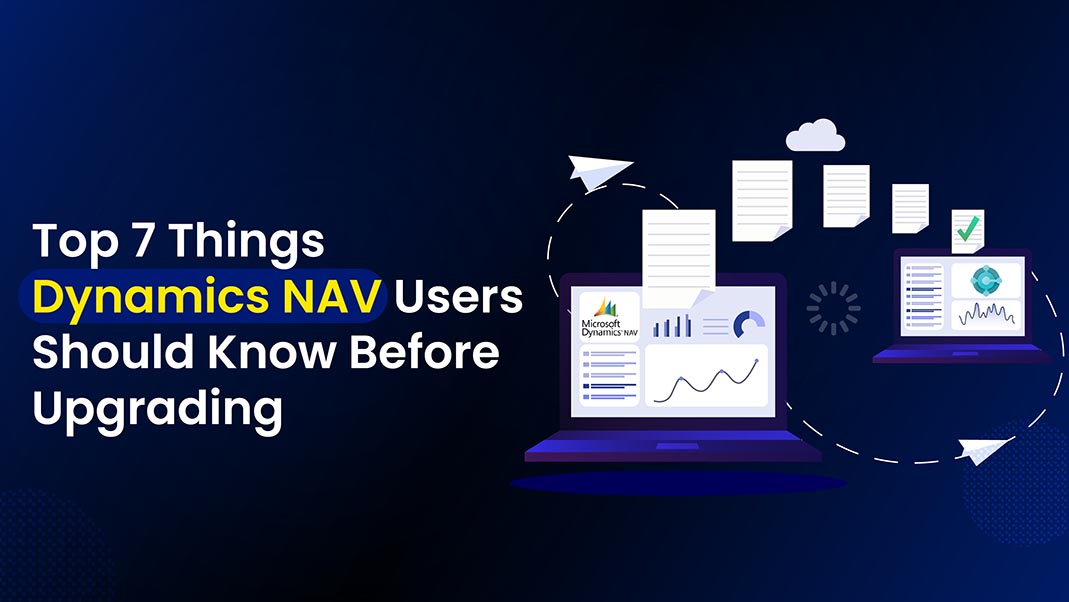The Top ERP Systems for 2025 Across Industries
In 2025, the ERP software landscape will be more dynamic than ever, reflecting the growing demands for digital transformation, automation, and business intelligence across industries. Companies of all sizes are seeking solutions that not only streamline processes but also provide agility and innovation.
This article spotlights the best ERP systems for 2025 that are set to shape the future of business management, offering insights into their unique capabilities, key features, and technical specifications to help you identify which system aligns with your operational goals and industry requirements. Whether you’re managing a small enterprise or a global operation, understanding these platforms can be the key to unlocking new levels of efficiency and growth.
The Top 10 ERP Systems for 2025
- Microsoft Dynamics 365 Business Central
- Oracle Fusion Cloud ERP
- SAP S/4HANA
- Infor CloudSuite
- Oracle NetSuite
- Epicor Kinetic
- Workday and Salesforce (Combined Offering)
- IFS
- Acumatica
- Odoo
Let’s dive into these ERP systems and discover what makes them stand out in the competitive ERP landscape.
1. Microsoft Dynamics 365 Business Central


Dynamics 365 Business Central is an all-in-one business management solution for small and medium-sized businesses, streamlining financials, sales, operations, and customer service. It integrates with Office 365 and other Microsoft products, enabling real-time insights, scalability, and automated workflows to enhance productivity and drive informed decision-making.
Best For: Mid-sized to large businesses, especially those already invested in the Microsoft ecosystem.
Strengths:
- Flexibility and Scalability: Adapts to various industries and business sizes, ensuring it grows with your organization.
- Familiar Interface: The Microsoft ecosystem promotes quick adoption and ease of use for existing users.
- Comprehensive Integration: Integrates seamlessly with Microsoft tools like Office 365 and SharePoint, enhancing productivity.
- Cost-Effective: Offers robust features at a competitive price point compared to other tier-one solutions.
Weaknesses:
- Complex Implementations: The implementation process can be time-consuming and requires expertise.
Key Features: A centralized database enhances collaboration across departments, offering modules for finance, HR, supply chain management, and CRM.
Technical Insights: Real-time data analytics and mobile accessibility provide visibility into performance metrics, allowing users to manage operations from anywhere.
2. Oracle Fusion Cloud ERP

Oracle Fusion Cloud ERP is a comprehensive cloud solution designed for large organizations that require extensive functionality across business processes.
Strengths:
- Open Architecture: Highly customizable, making it suitable for complex organizations.
- Comprehensive Ecosystem: Extensive features and support network due to Oracle’s history and partnerships.
- Advanced AI Capabilities: Uses AI-driven analytics and automation for improved efficiency and decision-making.
Weaknesses:
- High Implementation Complexity: Smaller organizations may find the deployment process daunting.
- Costly Maintenance: Ongoing maintenance and upgrades can be expensive for small businesses.
Key Features: Offers modular solutions for finance, supply chain, procurement, and HR, allowing businesses to choose based on specific needs.
Technical Insights: API connectivity enables smooth integration with other software while machine learning enhances business analytics for real-time insights.
3. SAP S/4HANA

SAP S/4HANA caters to large enterprises needing extensive industry-specific solutions, boasting comprehensive features and real-time data processing capabilities.
Strengths:
- Comprehensive Industry Solutions: Tailored offerings for sectors like manufacturing and supply chain management.
- Strong Resource Ecosystem: Backed by abundant resources and community support for guidance.
- Robust Data Security: Ensures data integrity with strong security measures protecting information at rest and in transit.
Weaknesses:
- Complex and Costly Implementations: The system’s complexity can make it challenging to deploy without significant investment.
Key Features: Built on an in-memory platform, SAP S/4HANA processes large datasets quickly, ideal for data-intensive businesses.
Technical Insights: SAP’s advanced interface enhances usability while providing detailed business intelligence for informed decisions.
4. Infor CloudSuite

Infor CloudSuite specializes in manufacturing, distribution, and healthcare sectors, offering industry-specific solutions with flexible deployment options.
Strengths:
● Industry Expertise: Provides tailored solutions for specific industries ensuring relevance and efficiency.
● Cost Efficiency: Competitive pricing makes it accessible for mid-sized businesses.
● Deployment Flexibility: Available as both a cloud and on-premise solution to suit various business needs.
Weaknesses:
● Integration Challenges: Merging acquired technologies has led to integration complexities.
Key Features: Focused on project management, manufacturing, and supply chain management, Infor CloudSuite aims to reduce manual tasks through automation.
Technical Insights: User-friendly navigation and advanced workflow automation enhance efficiency in streamlining operations.
5. Oracle NetSuite

Oracle NetSuite is a cloud-native ERP designed specifically for small to mid-sized businesses, offering a comprehensive suite of functionalities tailored to their needs.
Strengths:
- Cloud-Native Flexibility: Tailored for small to mid-sized companies with full cloud capabilities.
- Rapid Implementation: Quick deployment compared to other large-scale ERP systems.
- AI-Powered Insights: Utilizes AI analytics for real-time business performance tracking.
Weaknesses:
- Scalability Limitations: It may not fully meet the complex needs of larger enterprises.
Key Features: Dashboards provide real-time insights into key metrics while its mobile-friendly design ensures accessibility from anywhere.
Technical Insights: Offers a 360-degree business view enabling monitoring across multiple subsidiaries while supporting strong integration capabilities for tailored customization.
6. Epicor Kinetic

Epicor Kinetic targets mid-sized manufacturing and distribution companies with specialized modules designed specifically for these sectors.
Strengths:
- Manufacturing-Focused: Designed specifically for mid-sized manufacturing companies.
- Deployment Flexibility: Businesses can choose between cloud, on-premise, or hybrid deployment models.
- Modern UI: The sleek user interface enhances user experience significantly.
Weaknesses:
- Limited for Large Enterprises: While highly functional for mid-sized companies, larger enterprises may find it lacks certain advanced capabilities.
Key Features: Epicor Kinetic integrates smoothly with production planning, inventory management, and CRM tools to offer a unified solution aimed at improving operational efficiency within manufacturing environments.
Technical Insights: Advanced reporting tools facilitate data-driven decision-making while seamless module communication enhances overall effectiveness in manufacturing environments.
7. Workday and Salesforce

This innovative partnership combines Workday’s HR capabilities with Salesforce’s CRM expertise into one powerful cloud-based solution that focuses on workforce management and customer relations.
Strengths:
- Innovative Partnership: Collaboration delivers an unmatched cloud-based experience.
- Cloud-Native Platform: Enhances accessibility and scalability through its cloud-native solutions.
Weaknesses:
- Complex Integration: Integrating these two powerful systems can be tricky for businesses that are not tech-savvy.
Technical Insights: Advanced analytics tools help organizations forecast trends in workforce management and sales performance while robust security measures ensure data protection throughout the integration process.
8. IFS

IFS excels in asset management within industries like aerospace, energy, and construction – making it ideal for asset-heavy organizations seeking robust management solutions.
Strengths:
- Asset Management Expertise: Strong capabilities in managing assets across various industries.
- User-Friendly Interface: Simple navigation reduces the learning curve for users significantly.
Weaknesses:
- While powerful in asset-intensive sectors, IFS might not cater well to companies outside these niches.
Technical Insights: Comprehensive tools allow businesses to monitor project progress effectively while ensuring compliance with industry standards through detailed reporting features integrated into the system itself.
9. Acumatica

Acumatica is a cloud-based ERP designed for small businesses seeking cost-effective solutions with flexible implementation options that cater directly to their unique needs.
Strengths:
- Fully Cloud-Based Solution: Offers flexibility tailored specifically towards smaller businesses’ needs.
- Strong Integration Capabilities: Easily integrates with other software applications, allowing businesses to customize their setup uniquely based on individual requirements.
Weaknesses:
- Scalability Issues: May struggle when addressing larger businesses’ complex requirements or those experiencing rapid growth patterns over time.
Key Features: Acumatica’s modular approach allows small businesses to implement an incremental strategy, starting with core functionalities like accounting or inventory management before expanding into more complex areas such as CRM or project management as they grow.
10. Odoo

Odoo stands out as one of the most flexible ERP systems available today thanks largely to its modular design, which enables businesses to customize options based upon unique operational needs.
Strengths:
- Flexible Customization Options: Businesses can select only necessary modules tailored towards achieving specific goals without overwhelming themselves unnecessarily.
- Cost-Effective Solution For Smaller Organizations: An affordable option providing essential functionalities without compromising quality overall.
Weaknesses:
- Lack Of Advanced Features May Limit Larger Companies: Those requiring advanced functionalities might find Odoo lacking compared to competitors offering more comprehensive solutions overall.
Key Features & Technical Insights: Odoo’s flexibility lies within its modular approach, enabling gradual scaling alongside growing demands. Whether adding CRM tools or enhancing inventory management capabilities, Odoo grows alongside your business effectively, ensuring long-term adaptability and success.
Key Considerations When Choosing an ERP System:
- Business Size: Ensure the ERP system can scale with your business, accommodating growth without significant overhauls.
- Industry Requirements: Select an ERP that offers industry-specific functionalities to meet your unique operational needs.
- Deployment Options: Decide between cloud-based or on-premise solutions based on your company’s IT strategy and security requirements.
- Ease of Implementation: Consider the resources and time required for deployment, and choose a system that aligns with your capacity.
- Customization and Integration: Opt for an ERP that offers the flexibility to customize and integrate seamlessly with your existing software ecosystem.
- Security Measures: Prioritize ERP systems with robust security features to protect sensitive business data from breaches.
Future-Proof Your Business with the Right ERP System
Selecting the right ERP system is essential for organizations striving to stay competitive in today’s dynamic digital landscape. As technology evolves, ERP systems are becoming more adaptive, integrating AI-driven analytics, real-time data processing, and modular flexibility to accommodate diverse industry needs. To ensure long-term success, it’s not just about choosing the right software – it’s about partnering with a trusted implementation expert who understands your business nuances.
Nevas Technologies, a premier ERP implementation partner, stands out as an ideal collaborator. With a proven track record in deploying and customizing ERP solutions across industries, Nevas Technologies combines deep technical expertise with comprehensive business process knowledge. Their commitment to delivering efficient and scalable ERP implementation ensures that organizations of all sizes can achieve seamless digital transformation.
By partnering with Nevas Technologies, businesses can optimize their ERP investment, leveraging advanced technology solutions to drive growth, efficiency, and competitive advantage. As you plan your ERP strategy for 2025, consider the long-term benefits of working with an experienced partner like Nevas Technologies to secure your organization’s future in the digital era.




